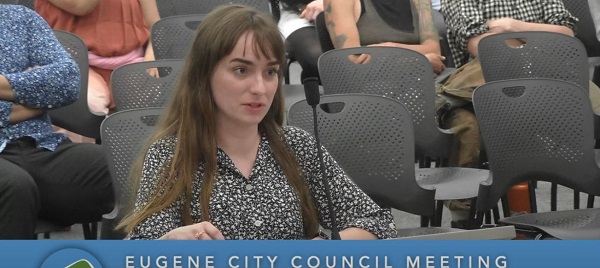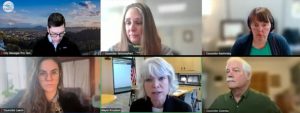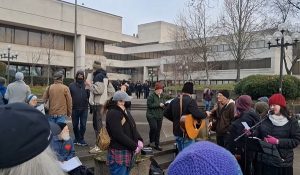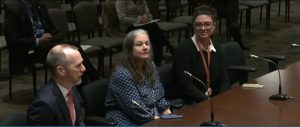Public comments ask city to budget for CAHOOTS
15 min read
Public comments April 14 make the case for fully funding CAHOOTS in Eugene as an economical and essential part of the public safety ecosystem. But will the City Council listen? Alexander Chamberlin:
[00:00:13] Alexander Chamberlin: Hello, my name is Alex. I look at numbers all day, so I’m going to be talking about numbers.
[00:00:17] Between fire and police patrol, we have about $100 million to spend on emergency response. These are operational costs, not including capital costs like cars and stuff that lasts. From the data that was presented at the town hall, we know that CAHOOTS responds to about 17% of all calls. So, in my opinion, if it took $8 million to fund CAHOOTS (which is, I believe, the right amount), it would be an amazing deal.
[00:00:49] And so, this is just fiscally responsible, I’m not even going to the humanitarian element of this. Fiscally responsible, this is what we should be doing.
So the obvious question is: Where do we get the money? And that’s the right question, phrased wrong. The right question is: We have $100 million, how best to spend it? And how best to spend it includes CAHOOTS. Thank you.
[00:01:15] Presenter: Jacob Trewe:
[00:01:16] Jacob Trewe: Hi there, Jacob Trewe speaking. I’m an accountant and this is basically the busiest night of the year, but I could not sit idly by at the reckless decision to eliminate CAHOOTS in Eugene.
[00:01:26] You may remember me from around 2021, when I spoke before the Budget Committee, City Council several times regarding the Community Safety Payroll Tax. I highlighted how this was a wasteful and inappropriate use of funds on several levels, but I’ll condense this a little bit.
[00:01:41] Part of how this payroll tax was sold was as a way to support CAHOOTS. Less than 10% of the funds from this tax went to support CAHOOTS, and I was looking at the last report, which was in 2023 (looks like the ’24 report is delayed), and I did not see any direct support for CAHOOTS in there at all. I’d love to be corrected if I’m wrong.
[00:02:00] You’ve done community surveys around this tax. In this survey folks overwhelmingly supported more funding for CAHOOTS and alternatives to police and carceral response. Eugenians love CAHOOTS. We have an entire room filled out there with people who are here talking about CAHOOTS.
[00:02:13] Here we are, five years out from enacting a tax to support community safety, and what’s happening? We’re cutting CAHOOTS, the most efficacious pillar of public safety in our community. I was going to go on about how CAHOOTS is wonderful, but you can have a lot of people talking about that soon.
[00:02:27] So I was at the town hall meeting put on by CAHOOTS, and I was distressed to see that not a single member of City Council was at that town hall meeting. That town hall presented how effective and efficiently CAHOOTS supports our community, and it was heartbreaking to see how all that research from PSU and U of O was turned into past tense. CAHOOTS were the most trusted part of community response. CAHOOTS was providing compassionate and effective preventative care to our community. And you know what? They still are in Springfield, not in Eugene. CAHOOTS in the 4J schools, they’re still providing care there too.
[00:03:04] I was talking with some CAHOOTS workers and I wanted to respond directly to some of the mayor’s comments.
[00:03:08] Eugene City Council has full power to fund and bring back CAHOOTS. Last year, in contract negotiations, Eugene offered 40% of the operational cost of running CAHOOTS. This is why White Bird couldn’t fund a CAHOOTS in Eugene. Springfield covers 100% of the operational cost of CAHOOTS in Springfield. That’s why Springfield still has CAHOOTS, and we do not.
[00:03:27] Presenter: Lydia Scott:
[00:03:28] Lydia Scott: Hello, my name is Lydia Scott. I’m here this evening as a community member, speaking on behalf of support for CAHOOTS. In 2020, they were recognized nationally, and the city was very proud to accept acknowledgement for that and have that model used across the nation.
[00:03:50] CAHOOTS came to the city and asked for $2.2 million of a brand-new tax that had been created, the CSI tax, and they were denied. And they were given $200,000. I wonder if you can imagine how that would feel to have that kind of national recognition and then to be treated like that.
[00:04:13] And here we are now in 2025 and they literally cannot operate anymore. And this is an issue, it’s not only for our houseless community and our mental health crisis, this is a safety issue for our entire community.
[00:04:29] I worked for the Eugene Fire Department for a short time as an EMT. And in that brief moment that I worked there, it was glaringly obvious the services that CAHOOTS provides, not only for our mental health crisis in this community, but as a resource for EMS, as a resource for the police.
[00:04:52] I was there for a very short time, and I’ll tell you what, the amount of times we were at capacity—which means there is nobody to go out on a call, no matter how severe it is—was alarming.
[00:05:04] And that was with CAHOOTS. That was with CAHOOTS diverting calls. They were taking calls that they are extremely more qualified to handle.
[00:05:14] I remember sitting in the street with a mental health crisis with somebody who felt like they had glass all over their body, and we sat in the street for a half an hour trying to help this person. Those are emergency calls that can’t be answered when that happens. Somebody’s bleeding out and there is nobody to go help, a completely preventable death, because we’re at capacity.
[00:05:39] That’s what CAHOOTS does for the community. Not just mental health, not just helping houseless people.
[00:05:47] Presenter: Sarah Boehm:
[00:05:48] Sarah Boehm: I’ve lived here for 10 years. I’ve called CAHOOTS several times to help friends and myself. I just really want to see you guys do everything you can to keep them running seven days a week. We are leading the country in, like, a revolutionary thing with CAHOOTS. Not a lot of cities have something like CAHOOTS and we’re setting an example for the rest of the country. And in this insane time where we’re losing all of our federal funding, we need to keep setting an example as a very progressive city, and we need to just take care of our own here, within the state, because the federal government is not going to take care of us. So we have to find the money and we have to do what we have to do to keep our society functioning. If the federal government is not going to help us, we have to help ourselves and we have to take care of each other.
[00:06:31] Presenter: Misty Bowman:
[00:06:33] Misty Bowman: My name is Misty Bowman… And I’d like to share how concerned I am with the closing of CAHOOTS, an agency that was vital to the well-being of Eugene, and helped ease the burdens of an overstressed and overworked police force. We need to find creative solutions to security and safety needs in Eugene and CAHOOTS should continue to be one of them…
[00:06:52] The police are overworked, as is, and no group could possibly perform all the functions we expect the police to in our society. And the solution is not overfunding them, but funding social programs that support the community and its health. Support CAHOOTS, support the library, support dark sky lighting, beat our swords into plowshares, turn our knives into pruning hooks.
[00:07:15] Presenter: Jack Baer:
[00:07:16] Jack Baer: Hi y’all. I’m also speaking on behalf of CAHOOTS and funding CAHOOTS in the next city budget. I know that there was, like, a break in services and a break in communication that led to the situation that we’re in today.
[00:07:27] And I also want to advocate for funding CAHOOTS in the next city budget. Specifically, there are no replacement services that can do what CAHOOTS does, um, did, is doing in Springfield.
[00:07:40] And if you’re someone here who’s listening to this and you love CAHOOTS, please keep showing up to these City Council meetings. Please keep advocating for city funding to go to CAHOOTS. There are five more City Council meetings before July which is when the city budget goes through.
[00:07:53] Honestly, I’m not super familiar with the process, because it’s my first City Council meeting. I’m not the kind of person that does this. But please keep showing up for CAHOOTS.
[00:08:01] Show up to these meetings, be vocal, be loud. And for you who have the power in your hands to make this decision, for myself and for everybody else who has spoken today, please fund CAHOOTS.
[00:08:10] Presenter: Waffles Hidalgo:
[00:08:11] Waffles Hidalgo: Hello, my name is Waffles Hidalgo. I’m here in support of CAHOOTS and I, at this point, I have nothing else to add to the amazing speeches of my community members, but maybe I’ll tell you my story. I moved here six years ago from Philadelphia, Pennsylvania and was dropped here on my butt and didn’t know if I wanted to stay here. And to be honest with you, the one thing that made me proud about living here was CAHOOTS.
[00:08:38] Presenter: Patrick Driggett:
[00:08:40] Patrick Driggett: My name is Patrick Driggett. During a town hall at University of Oregon last week, we learned just about how much CAHOOTS does for us. To recap: the broad community, EPD, and Eugene Springfield Fire view CAHOOTS positively and add to public safety.
[00:08:53] I don’t know about you, but I don’t think there’s a lot of other things that the activists of the city and the police agree on. So I think, yeah, CAHOOTS earned that trust over 35 years.
[00:09:05] CAHOOTS is well understood and a highly impactful third member of public safety, which cannot be said of (Lane County) MCS (Mobile Crisis Services), I might add. I think we also know what it costs to maintain a police department and we’re even more personally aware of how much medical care costs.
[00:09:21] And we should see that and understand and surmise that CAHOOTS is extremely cost-efficient while providing services that are complementary to EPD and Eugene Springfield Fire. They’re not a replacement. They’re a part of a public safety triangle.
[00:09:39] It’s my belief that the City Council should treat the situation as a public safety emergency and immediately work with former CAHOOTS staff to prioritize getting them back on the road 24/7 while covering 100% of their extremely favorable rate where their staff can be paid a living wage.
[00:09:54] It would be an error to address this as a line-item expense that cannot be budgeted, as the monetary and human cost increase to not having CAHOOTS is far higher. We need them on the road.
[00:10:07] Borrowing my friend’s words, you need to talk with the fired Teamster CAHOOTS workers about how to get their van back on the road ASAP. Mobile crisis response is not a replacement. Pay these union workers the wages they deserve and get these passionate, skilled, brilliant workers back out helping on the streets. Reallocate the safety payroll tax to fully fund CAHOOTS workers or you’re not going to see support for continuing this misguided payroll tax when you come asking for it again in 2027.
[00:10:39] With my remaining time, I would like to share that I am disappointed that most of our city councilors did not use their time to present items of interest to include the CAHOOTS situation. We reached out. I know I did. You must have been aware of the situation. I saw you talking about it beforehand in the lobby. You represent us and we are not happy. And if this isn’t an item of interest, then your election won’t be of interest to us.
[00:11:03] Presenter: Kamryn Stringfield:
[00:11:05] Kamryn Stringfield: My name is Kamryn Stringfield… First of all, thank all the people that have spoken tonight in support of CAHOOTS. This is very important. The closure of CAHOOTS in Eugene is just another shameful example of services lost that benefit our community in a very important way. Examples include University District hospital, the Hourglass Community Crisis Center, the White Bird Front Rooms, now CAHOOTS.
[00:11:27] You’re also trying to criminalize mutual aid. ‘Food Not Bombs’ and ‘Neighbors Feeding Neighbors’ are just trying to feed our community, and yet you go after them and try to criminalize them and make that impossible.
[00:11:39] And then while all of this is going on, and you also want to cut the library, the fire department, et cetera, while all of this is going on, the police get more funding, corporations and the wealthy get tax exemptions, and we get left in the dirt. Working-class people in Eugene are struggling to pay for their needs. The rents are too damn high to pay. The groceries are too damn expensive to buy. We’re struggling to eat, we’re struggling to live.
[00:12:08] Most people are one emergency away from homelessness, and look how the homeless are treated here. It’s illegal to exist outside. It’s shameful. The people of Eugene won’t stand this, as you see tonight with all the people that are here.
[00:12:23] Presenter: Kelsey Moore:
[00:12:24] Kelsey Moore: My name’s Kelsey Moore. I’m here to speak in support of CAHOOTS and I’m really curious, along with you all, to better understand what’s happening.
[00:12:34] I understand that White Bird might be under new leadership and I’m curious if that’s an opportunity for the city to further the conversation about what the next phase of CAHOOTS would look like and I’d like to urge the City Council to not approve a budget that doesn’t include CAHOOTS when that comes around this summer.
[00:12:54] I’d really like also to hear more from the city in general to understand more about what the current budget for the upcoming year looks like what was budgeted for CAHOOTS and their contract, I’d like to understand more about the finances behind that. And I’d urge the city to share that with citizens as we’re all really curious to learn more.
[00:13:15] I’ve lived in Eugene for over 30 years, called CAHOOTS as everyone testified for friends, family, community members, and it would be a great loss to our community. But again, I’d urge you not to approve a budget that doesn’t include CAHOOTS, and I’d really like to learn more about the finances, timing, and decision-making, and I’d like to see the city approach White Bird, and have further conversations about this possibility.
[00:13:39] Presenter: Katie Coy:
[00:13:40] Katie Coy: I’m Katie Coy. Just as so many others have said, I want to reiterate: CAHOOTS is a huge part of what made the city of Eugene so special and so safe for me in my undergrad years ago. And now that I live here year-round working in childhood behavioral health, it’s just something that honestly, I’m ashamed to say, I almost took for granted that it would always be there, because it seemed like such a no-brainer, and was such a part of the fabric of the community. And I’m realizing that I can’t make that mistake anymore.
[00:14:12] So I’m not taking it for granted anymore and just wanted to add my voice to the people who have spoken their support for CAHOOTS.
[00:14:20] Presenter: Andrew Simrin:
[00:14:22] Andrew Simrin: My name is Andrew Simrin… Part of the climate crisis, many young people are having mental health issues with absorbing all of the changes that are going on in our world. And services like CAHOOTS can help prepare people for the physical and mental externalities that climate change brings on to the community.
[00:14:47] So I’d like to again support for electrification and support for CAHOOTS and I’d like to yield my the rest of my time so more people can talk.
[00:14:59] Presenter: Mika Scott:
[00:15:00] Mika Scott: Mika Scott, member of the community, and I, listening to everybody speak tonight and supporting CAHOOTS, which I do, made me think about the fact that we live in a country where our military budget is budget is greater than the next eight or 10 countries combined. That includes China and Russia and all the other countries in that field.
[00:15:30] And at the same time, we’re cutting things like Medicaid and Medicare and possibly Social Security services that keep people alive. And I see the same pattern going on here, where a service that is essential to our community, to the health and well-being of our community, is being cut while the police are getting more money.
[00:15:57] It seems inhuman. It doesn’t seem reasonable to do that any more than it does on our national level. It’s going to bring the country down and it’s going to bring our community down. And people will fight back. And your jobs are going to be on the line because the community isn’t going to stand for it.
[00:16:18] Presenter: Sarah Boom:
[00:16:19] Sarah Boom: My name is Sarah Boom. My grandfather often told me, if your only tool is a hammer, you’ll see every problem as a nail. I thought of that when I heard CAHOOTS is leaving Eugene.
[00:16:30] In most cities in the U.S., their only tool is the hammer of policing. The thing is, people in mental health crises are more like screws than nails. If you hammer a screw into the wall, you’ll damage both the wall and the screw.
[00:16:43] Eugene is the only one, Eugene is one of a few cities that has a screwdriver in the form of CAHOOTS. The careful application of the right tool can prevent damage and build support. Right now, the right tool is gone and the only one left is the violent and effective one. Fund CAHOOTS, which is the right tool to help people in crisis. Thank you.
[00:17:02] Presenter: Nick Austin:
[00:17:04] Nick Austin: Nick Austin. This is directly from the Eugene City Council website, City Council’s ‘Special Interests and Concerns.’
[00:17:11] Eliza Kashinsky: “Homelessness: Support solutions that reduce the impacts of homelessness for all our residents.’ Matt Keating: ‘Mental health and vital public safety investments, including CAHOOTS and community policing models that save lives and foster positive police community relationships.’ Alan Zelenka: ‘Human services.’ Jennifer Yeh: ‘Public safety support agencies that protect ourselves, our children, health and property.’
[00:17:35] Mike Clark: ‘Enhanced livability.’ Greg Evans, actually, no listed interest in mental health care or human services, but at least you don’t pretend to care. Lyndsie Leech: ‘Mental health prevention and services.’ Randy Groves: ‘Employ realistic and effective solutions focused on outcomes to address homelessness.’
[00:17:52] What do realistic and effective solutions look like when you have a national recognized mobile mental health crisis worker and Class B paramedic team that you allocate 2% of your police budget to, when they take 17% of the calls to which the police would otherwise be dispatched?
[00:18:07] I worked full-time at this town’s lowest-barrier homeless shelter overnight for over two years in direct care of hundreds of unhoused people. Between medical and mental health emergencies, it’s the kind of job that often requires calling in backup.
[00:18:19] Repeatedly, in the most harrowing moments of my professional life, these outstanding exemplary frontline workers we call CAHOOTS were there for me when no one else was.
[00:18:28] And we are watching you stand here in front of the town you serve and pass the buck. This operation has needed more support from the leadership of this city for years and you undermine them by repeatedly cutting them a crumb of the police budget and then creating a half-cooked supplemental program.
[00:18:43] Your supplement can’t provide on-site wound care so they transport more of our unhoused populations to wait half the day in an already-full emergency room. Who will we send in the middle of the night to take care of our friends and family, when someone is needed to be brave, face the crises, reverse the overdoses, de-escalate the traumatized, while exemplifying a humanistic approach?
[00:19:02] I say you do it. This is your mess. You can clean it up, or with the exception of Councilor Evans, change your b—s— special interests and concerns on your g—d— website.
[00:19:12] Presenter: Community members make the case that CAHOOTS is an economical and valuable service that deserves full funding from Eugene, just as in Springfield. The city manager will propose the budget April 30 and the Budget Committee will hold three meetings in May.
See Also:
- Part 1: Public comments ask city not to lose CAHOOTS, too
- Part 2: Public comment: Personal stories about CAHOOTS
This story produced by John Q, sponsored through the Whole Community Time Bank by generous listeners at KEPW 97.3, Eugene’s PeaceWorks Community Radio.




